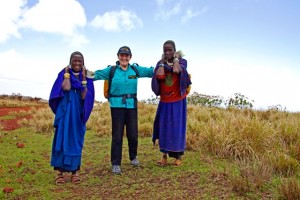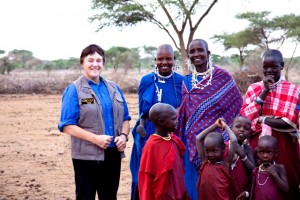
From Helen Thayer’s lifetime of arctic expeditions, studies on wolves, and determination to go where so few people could even survive, much less welcomed, we can only look to her for a snapshot of what her eyes have seen. It was considered a mutual honor and privilege for the Maasai tribe of Africa to invite Helen and her husband Bill to walk, eat, and live with them as they traveled from camp to camp.
For Helen, life is too short to passively observe when there are so many different angles to explore. Thayer has always taken the path least trodden and typically brings back experiences most of us can only view through the vicarious lens of her photos and words.
That’s the sense we have each time we speak with her; each time just getting to know her a little bit more. Most recently we had a conversation with Thayer at the CORDURA brand compound within the Outdoor Retailer winter trade show in Salt Lake City, Utah. CORDURA brand, one of Thayer’s devoted sponsors of her adventures, has to pluck her off some of her journeys now and then just so she can spend some time downloading her wanderings and holding court at speaking engagements and trade show appearances so the rest of us rat racers can tap into a tiny slice of her inexhaustible energy.
So it was, we stole our couple of minutes with Helen at the end of a trade show day, when the entire Salt Palace had already fired up the guest musicians, cracked the wine bottles and tapped the beer kegs. We had to step away just to be able to hear each other. Off we went around the corner behind the enormous walls marking the outside boundaries of temporary fortresses known as corporate marquis — or booths that approach acreage rather than square feet in size. It was in this beehive-busy environment, with its cacophony of ambient noise and clutter of commerce, that we seized a moment to catch up on Thayer’s recent visit with the Maasai tribe of Africa.
Some folks call them Masai; others refer to them as the Maasai tribe. Each way is a acceptable to describe these gentle nomadic people who range in the Great Rift Valley regions between Kenya and Tanzania on the African Continent. Like Helen and Bill, these ancient people like to stay on the move where they cover great distances that might seem random to some, but very deliberate and with purpose. And like the Masai, Helen marches to the beat of her own drum; always has and always will.

By some accounts, the Maasai are a people with a footprint that dates more than 3,000 years ago. But recorded history fails us in that so little is actually documented or accurately known about the Maasai. Teachings, legacies, fears, and myths are passed down from one generation to another by word of mouth, and by example.
Helen talked about the Maasai in terms of their wonderful and genuine spirits as human beings. In some ways they are light years ahead of what modern people like to consider as advanced. Maasai people have no use for the rigid schedule of life held so dearly to the hearts of First World countries. No, the Maasai eat when they are hungry. They sleep when they are tired. There will be no setting the clocks forward an hour on March 14, 2010 to observe daylight savings time. The Maasai don’t need clocks.
When a group of Maasai fancy a meal, they’ll go hunting (or gathering) as their daily agenda is determined by the priority of immediate need. Hunters slip into the bushland or forest and locate a less-than-vigilant fur bearing creature, slip an arrow between the second and third rib, build a fire and eat the poor bastard right where it fell.
REM sleep is said to be best when a person is tired and ready to sleep. So that’s when the Maasai take their rest…when they are tired. And though they seem to wonder from location to location, camp to camp, the Maasai know where every camp is. They don’t rely on compass headings or topographical maps, they know their headings according to landmarks, geologic and vegetation changes, and the inherent GPS functions stored in their DNA from previous ancestors and frequent visits.
As seasons change, so do the Maasai. The encroachment of civilization has compelled the Maasai to adapt to the modern world to some degree. They are no longer the fierce warriors of centuries gone by. Yet they retain their close-knit family values that includes the nurturing and caring for the young, and the high regard and humble respect they have for their senior aunts, uncles, grandmas and grandpas.
Although well-meaning and ignorant missionaries tried to change the Maasai according to their legalistic world view, the Massai have accepted the good intentions of missionary work and filtered out the bad. Maasai continue to create and wear their colorful robes and clothes. They continue their traditional ways of rearing their children in love and respect for the land. The Maasai continue to smile, laugh, and sing just like they have for centuries. What is common for the Maasai is now a foreign thought to most modern peoples and governments around the world. They honor their senior tribesmen and treat them with dignity and respect.
The way Helen described it, if she and her husband were forty-something-year-old westerners asking to accompany the Maasai, the request might well have been denied. Because Helen and Bill are senior people, the Maasai found it much easier to welcome them and share with them the same kind of admiration and warmth they reserve for their own Maasai seniors. How cool is that?
And diplomacy, are the Maasai a peaceful people these days? Well, conflict resolution is an art form for the Maasai when they travel through grassland and triple canopy forests. The Maasai intuitively know when the lion is satiated with a belly full of wart hog, so they pass by at a respectful distance but don’t fear attack. They know when the lions are on the hunt, and give that real estate a wide berth. No worries, we’ll just walk around and take a different route. No worries…no drama. The Maasai understand the politics of getting along with wildlife great and small.
This same diplomacy and wisdom are practiced when elephant herds are in the area. The Maasai know when to give plenty of space to the mammals they share the land with; they know when to steer clear of a mama elephant with calf, a cantankerous bull pacaderm who tends to be confrontational, or an individual hippo given to bouts of running amok. Maasai understand the wildlife as well as they accept the very cycle of life.
Yet interestingly enough, there are no grand rituals or the loud, shrill wailing when an elderly Maasai or tribesman takes that last breath. They don’t build a bonfire and torch their beloved deceased. They acknowledge the death and they mourn in their own way. But they understand life is but a vapor when measured across the arc of time immortal. When a Maasai member gives up the ghost, kinsmen kindly dig a hole, place the body in the grave, and cover it up. They might leave a bouquet of flowers within an arm’s reach of the burial plot. They might go so far as to leave a stone. But they immediately move forward to the next camp, the next valley. They know how to carry on with the grace, dignity, and wisdom that has guided them into the 21st century.
We’re looking forward to learning much more about the Maasai tribe and Helen’s observations and take when she gets home from her current trip living with the Berber tribe of Africa. Mrs. Thayer should be back at her Seattle, WA home sometime around April where we hope to share much more of her recent journeys with the Fresh Air audience. You can learn more about Helen’s past accomplishments and books by going to: www.helenthayer.com.
By Rick Shandley
One thought on “Helen Thayer in Africa: An Update On Her Latest Adventures”